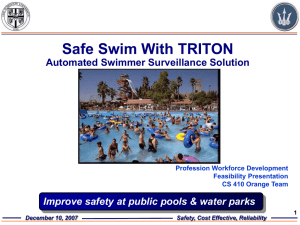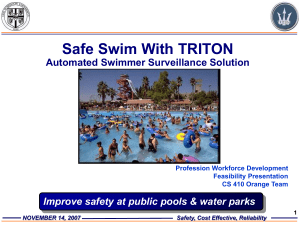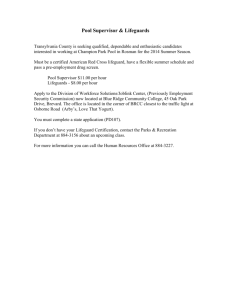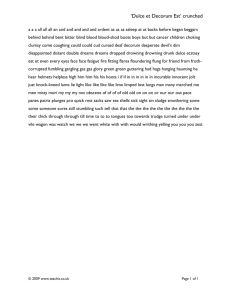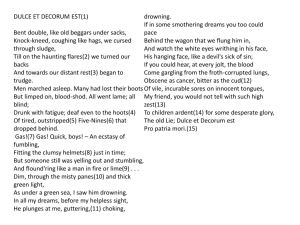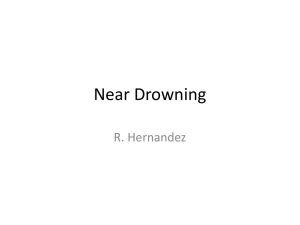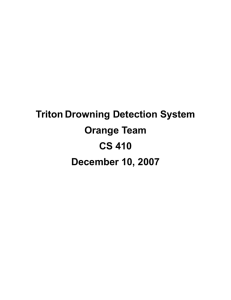1 NOVEMBER 5, 2007 Safety, Effectiveness, Reliability Safe Swim
advertisement
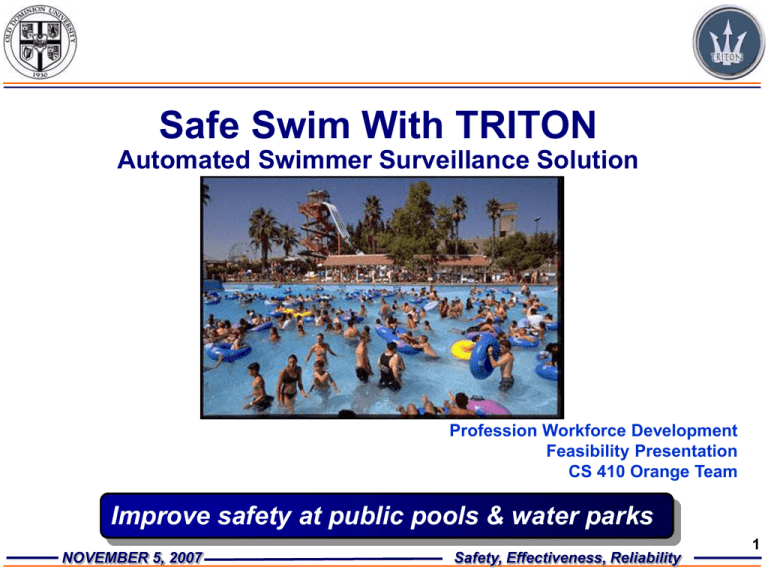
Safe Swim With TRITON Automated Swimmer Surveillance Solution Profession Workforce Development Feasibility Presentation CS 410 Orange Team Improve safety at public pools & water parks NOVEMBER 5, 2007 Safety, Effectiveness, Reliability 1 Orange Team Kate Nguyen Project Manager Scott Seto Software Specialist NOVEMBER 5, 2007 Cesar Barbieri Marketing Specialist Brandon Simpkins Hardware Specialist Dave Larnerd Finance Specialist Safety, Effectiveness, Reliability 2 Silent Drowning Over 2000 people drown every year in pools staffed with certified lifeguards due to a lack of real-time information available to the lifeguard. NOVEMBER 5, 2007 Safety, Effectiveness, Reliability 3 How Long Will We Wait? NOVEMBER 5, 2007 Safety, Effectiveness, Reliability 4 Recent Drownings June 20, 2007 4-year-old Wakefield Girl Drowns Great Wolf Lodge in Williamsburg, VA July 4, 2007 Lifeguards Unable To Revive 29-year-old Woman In Wave Pool (Splashin' Safari) Holiday World in Santa Claus, IN July 13, 2007 4-year-old Boy Drowns In Wave Pool Great America Amusement in Santa Clara, CA For more information see Appendix A.1 in the feasibility documentation NOVEMBER 5, 2007 Safety, Effectiveness, Reliability 5 Drowning • “Six people drown in U.S. pools every day. Many of these pools are public facilities staffed with certified professional lifeguards.” --Centers for Disease Control • “19% of drowning deaths involving children occur in public pools with certified lifeguards present.” --Drowning Prevention Foundation • “Drowning is the second-leading cause of unintentional, injury-related death among children under the age of 15.” --National Center for Health Statistics • “Drowning is the 4th leading cause of accidental death in the United States, claiming 4,000 lives annually. Approximately one-third are children under the age of 14.” --American Institute for Preventive Medicine • “A pool is 14 times more likely than a motor vehicle to be involved in the death of a child age 4 and under.” --Orange County CA Fire Authority For more information see Appendix A.2 in the feasibility documentation NOVEMBER 5, 2007 Safety, Effectiveness, Reliability 6 Drowning Deaths By Age 60 to 64 55 to 59 50 to 54 45 to 49 0 to 19 40 to 44 35 to 39 30 to 34 25 to 29 20 to 24 From 1999-2004 total drowning deaths = 17,710 http://webappa.cdc.gov/sasweb/ncipc/mortrate10_sy.html NOVEMBER 5, 2007 Safety, Effectiveness, Reliability 7 Additional Consequences • For every child who drowns, four are hospitalized for near drowning. American Academy of Pediatrics • Non-fatal residual effects of drowning - Brain Damage - Lung Damage - Acute Respiratory Distress Syndrome (ARDS) - Aquatic phobia • initial medical treatment costs at least $75,000 and about $250,000 a year for long-term care. The cost of a single near-drowning that results in brain damage can be more than $5.5 million. www.usa.safekids.org NOVEMBER 5, 2007 Safety, Effectiveness, Reliability 8 What Are We Doing About It? Many parks have added more lifeguards and installed various drowning detection systems (such as Poseidon TM) in response to silent drowning. These attempts at a solution are not adequate and they are expensive. NOVEMBER 5, 2007 Safety, Effectiveness, Reliability 9 Competition Matrix NOVEMBER 5, 2007 Safety, Effectiveness, Reliability 10 Lifeguard Challenges • Ellis & Associates study of lifeguards • Vigilance capacity – only 30 minutes - Heat - Noise / Distraction - Monotony - Stress - Fatigue - Poor diet - Dehydration NOVEMBER 5, 2007 Safety, Effectiveness, Reliability 11 Jeff Ellis & Associates Firm • International Aquatic safety and risk management consulting firm that has revolutionized lifeguard training in the U.S. • Study – how quick lifeguards could spot swimmer in trouble underwater. 500 tests at more than 90 locations varying sizes and lifeguard staff. • Each case: manikin placed underwater in pool; tester started clock once fully submerged. www.jellis.com NOVEMBER 5, 2007 Safety, Effectiveness, Reliability 12 Ellis Study Results Effects over Time Death and Brain Damage Cardiac Arrest and ARDS Aqua phobia www.jellis.com Average Rescue Time - 1:14 NOVEMBER 5, 2007 Safety, Effectiveness, Reliability 13 Poseidon TM • Cost – the cost of a Poseidon TM system ranges from $75,000 to $150,000 (High hardware costs) • Poseidon uses complex imagery analysis which is very complicated in difficult environments (murky water, high amounts of glare) • Limited detection – Poseidon TM can only detect motionless victims on the bottom of a pool and it does not detect depth http://en.wikipedia.org/wiki/Poseidon_drowning_detection_system#Success_and_failure http://www.isrm.co.uk/recreation/documents/REJan05pp36-39Lifeguard.pdf http://lear.inrialpes.fr/people/triggs/events/iccv03/cdrom/iccv03/0532_eng.pdf NOVEMBER 5, 2007 Safety, Effectiveness, Reliability 14 Market Analysis Would your organization be interested in technology that would help prevent or reduce drowning incidents? Aquatics Director Prince William County Park Authority: “Always, Anything that will help prevent or reduce the likelihood of a drowning would be worthy of exploring.” Ocean Breeze water park manager: “Yes, but cost is a major consideration.” NOVEMBER 5, 2007 Safety, Effectiveness, Reliability 15 Triton Solution GOAL: Provide an effective, reliable, low cost system that will decrease silent drowning incidents at pools and waterparks around the world. It is our commitment to meet this goal and seek continued innovation and solution improvement. NOVEMBER 5, 2007 Safety, Effectiveness, Reliability 16 NOVEMBER 5, 2007 Safety, Effectiveness, Reliability 17 NOVEMBER 5, 2007 Safety, Effectiveness, Reliability 18 Sensor Technology Standard WiFi ZigBee Bluetooth 802.15.1 RuBee 802.11 802.15.4 Application Voice Data Data RFID Monitor Control Cable Replace Visibility Tracking 1 MB + 4 -32KB 250 KB 10KB 0.1 KB Battery Days .5-1 10-100 1-7 4,000 NA Bandwidth KB/s 11,000 20-150 720 1 100 Net Size 32 No-limit 7 No Limit 48 Range M 1-300 1-100 1-10 1-30 1-5 Security High High High High Low Base $ $60-$500 $100-$500 $50 $1 - $200 $500-$1,500 Node $ $15-$50 $15-$50 $50 $0.1-$10 $0.05-$4 P1902.1 Visible Assets, Inc.© NOVEMBER 5, 2007 Safety, Effectiveness, Reliability 19 Rubee Characteristics • Magnetic Spectrum: RuBee uses a 131 kHz carrier which is entirely magnetic, therefore the protocol is almost unaffected by harsh environments • Active Xmit: RuBee tags are radiating transceivers and actively transmit their own signal, where as RFID tags work in backscatter transmission mode and just reflect radio signals. • Sensor add on: RuBee tags can be outfitted with sensors and have a small 4 bit CPU with a small amount of memory on them. NOVEMBER 5, 2007 Safety, Effectiveness, Reliability 20 Triton Advantages • Increased detection rate • Low cost • Easy to install and maintain • Less privacy concerns NOVEMBER 5, 2007 Safety, Effectiveness, Reliability 21 Risk Matrix Impact 5 A Potential Risks A HW & SW Interoperability B Legal Liability C Hardware Availability D Unit Malfunction 4 D B 3 F C 2 E False Positives F Market Competition E 1 1 NOVEMBER 5, 2007 2 3 4 5 Probability Safety, Effectiveness, Reliability 22 Risk Management Potential Risks Risk Management A HW & SW Interoperability Adequate hardware and software testing B Legal Liability Seek legal assistance C Hardware Availability Seek COTS products D Unit Malfunction System software will have hardware diagnostics E False Positives Tune sensitivity of system F Market Competition Effective pricing strategy & reliable product NOVEMBER 5, 2007 Safety, Effectiveness, Reliability 23 Estimated Cost of TRITON Solution (17,000 sq. foot wave pool application) - 15 Receivers ~ $100 each = 1,500 - 2000 RuBee tags ~ $2 each = 4,000 - 4 P.C.’s ~ $850 each = 3,400 - 4 Touch screens = 1,800 ~ $450 each - TRITON software pkg = 9,000 Total ~ $19,700 NOVEMBER 5, 2007 Safety, Effectiveness, Reliability 24 Our Customers Primary Customers: Water Parks (>1000 in U.S.) Secondary Customers: Recreation centers Apartment complexes Schools and Universities NOVEMBER 5, 2007 Safety, Effectiveness, Reliability 25 Customers ROI • Triton bracelets can be rented out to customers or subsidized in entry cost. • Triton provides a safer swimming environment and the pool can be marketed as such • Avoidance of law suits (reduced insurance costs) NOVEMBER 5, 2007 Safety, Effectiveness, Reliability 26 Conclusion - Silent drowning is a growing problem - The major cause for silent drowning is the lack of real time information available to lifeguards - Our solution informs the lifeguard of potential drowning victims, so that they can rescue the person in a reasonable amount of time. - Triton can be used in conjunction with Poseidon TM and other drowning detection systems NOVEMBER 5, 2007 Safety, Effectiveness, Reliability 27
